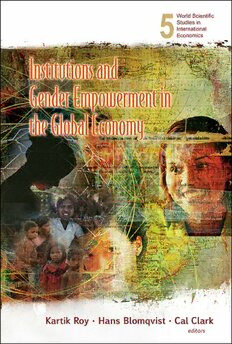
Institutions and Gender Empowerment in the Global Economy: Developing Countries (World Scientific Studies in International Economics) PDF
329 Pages·2008·2.508 MB·English
Most books are stored in the elastic cloud where traffic is expensive. For this reason, we have a limit on daily download.
Preview Institutions and Gender Empowerment in the Global Economy: Developing Countries (World Scientific Studies in International Economics)
Description:
Since women account for almost 50 percent of the world s population, the sustainability of development of the global economy can be greatly impaired if the state authorities in individual countries pay less attention to the improvement in the socio-economic status of women relative to men. Improvement in socio-economic status which facilitates empowerment of individuals is greatly dependent on conducive informal institutions and state institutions. This book is the first of its kind to critically examine the role of these institutions in women s empowerment in five continents in the world. The analysis of the role of institutions in individual countries is underpinned by a robust theoretical background presented in the first three chapters. The chapters on individual countries also include a section dealing with recommendations for changes in state policies affecting women s empowerment. Contents: Development and Gender Empowerment: Conceptual and Theoretical Issues (K C Roy et al.); Dimensions of Poverty and Discrimination Against Women (K C Roy et al.); Can the State and Its Institutions Facilitate Gender Empowerment? (K C Roy et al.); Institutions and Gender Empowerment in India (K C Roy); Gender, Institutions, and Empowerment: Lessons from China (J Howell); Institutions and Gender Empowerment in Taiwan (C Clark & J Clark); Institutions and Women s Empowerment in Kenya (T W Kiriti-Nganga); Institutions and Gender Empowerment in the Global Economy: The Peruvian Case, 1990 2005 (P Fuertes); Institutions and Gender Empowerment in the Fiji Islands (B C Prasad & N Lata); Gender Empowerment and the Status of Women in Great Britain (R P McEldowney); Institutions and Women's Empowerment in the United States (C Clark & J Clark); Institutions and Gender Empowerment in Greece (R Dellios); Institutions and Women s Empowerment in the Contemporary World (C Clark et al.).
See more
The list of books you might like
Most books are stored in the elastic cloud where traffic is expensive. For this reason, we have a limit on daily download.
